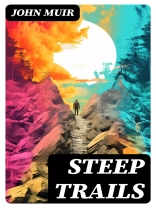In ‘Steep Trails, ‘ John Muir offers a captivating exploration of the American wilderness, weaving together personal recollections, philosophical musings, and vivid descriptions of nature’s grandeur. His lyrical prose illuminates the intricate beauty of landscapes ranging from the Sierra Nevada to the Canadian Rockies, detailing not only the physical world but also the spiritual connection Muir felt with nature. This work emerges from the rich tradition of American Romanticism, reflecting the transcendental belief in nature’s power to enlighten and uplift the human spirit, while also serving as an early advocacy for environmental conservation. John Muir, often hailed as the ‘Father of the National Parks, ‘ was profoundly influenced by his extensive travels and deep-rooted appreciation for the natural world. His experiences as a naturalist and activist during the late 19th and early 20th centuries informed his passionate writings. Muir’s commitment to preserving the wilderness of America led him to articulate the profound relationship between humans and the environment, making his insights not only personal but also universal. ‘Steep Trails’ is an essential read for anyone captivated by the beauty of nature or interested in environmental conservation. Muir’s reflections invite readers to see the world through the eyes of a devoted naturalist, encouraging a deeper appreciation for the wild places we often take for granted.
Sobre o autor
John Muir (1838–1914) was a Scottish-American naturalist, author, environmental philosopher, and early advocate for the preservation of wilderness in the United States. His letters, essays, and books narrating his adventures in nature, especially in the Sierra Nevada mountain range, have been read by millions. Muir’s enthusiasm for nature was boundless, and his written works expound upon his naturalist philosophy and his adventures in the wild. His book ‘Steep Trails’ is a collection of articles and essays that he wrote over a number of years, celebrating the beauty, spirit, and challenges of the mountain landscapes he held dear, specifically the Sierra Nevada and areas in California (Muir, 1918). In the literary realm, Muir is known for his poetic and evocative style, which not only reflects his deep knowledge of the landscapes he explored but also his personal transcendentalist philosophy that espoused a direct connection between nature and the human soul. Muir was not just an author but also an activist, his advocacy was instrumental in the establishment of national parks and his legacy is strongly tied to the conservation movement. Muir’s passion and literary contribution have cemented his place as an icon in American environmentalism, earning him the nickname ‘Father of the National Parks.’ He co-founded the Sierra Club, an organization that is a testament to his commitment to protecting natural spaces. The club remains a leader in environmental causes to this day.












